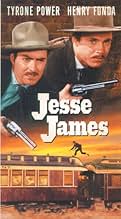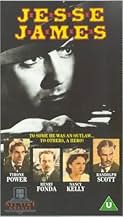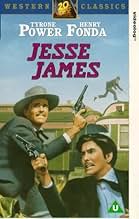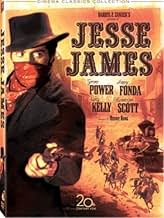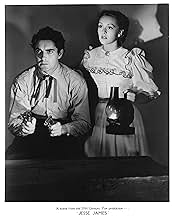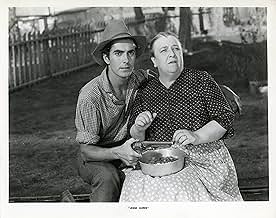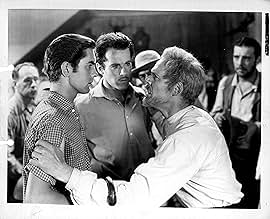AVALIAÇÃO DA IMDb
7,0/10
5,2 mil
SUA AVALIAÇÃO
Adicionar um enredo no seu idiomaAfter railroad agents forcibly evict the James family from their family farm, Jesse and Frank turn to banditry for revenge.After railroad agents forcibly evict the James family from their family farm, Jesse and Frank turn to banditry for revenge.After railroad agents forcibly evict the James family from their family farm, Jesse and Frank turn to banditry for revenge.
- Direção
- Roteiristas
- Artistas
Johnny Russell
- Jesse James Jr.
- (as John Russell)
Avaliações em destaque
Of all the films Hollywood made during the golden years, my least favorite were ones that played very fast and loose with the facts about the Old West. And, of all the Westerns, those about Jesse James as well as the gunfight at the OK Corral are the worst. Think of it from my point of view. I am an American history teacher and for some bizarre reason, I like my historical films to actually bear some semblance to what actually occurred!!
JESSE JAMES, like all these other films, is a historical nightmare from start to finish. The life of this evil killer and thief is practically impossible to discern in this silly but entertaining film from 20th Century-Fox Studios. Instead of a bad man, according to the film, he is unfairly pushed to a life of crime by an evil railroad AND he and his brother, Frank, are good boys at heart!! With such stupid revisionism, we should soon expect to see films where Hitler, Lee Harvey Oswald and Jeffrey Dahmer are heroes!! There are tons more mistakes about the characters--but simply too many to bother mentioning. In fact, what is NOT wrong would be quicker and easier to discuss!! Additionally, there are just every cliché known to Westerns, such as the shootout ("count three and fire"), Frank giving the town an ultimatum to give him back Jesse by midnight "or else", happy and intensely loyal Black servants, the Robin Hood-like quality of the gang (though at least they showed how eventually he became more of a hardened criminal), the death of Frank and Jesse's momma pushing them to crime, Henry Hull's character from start to finish as well as his comments like "Jesse played fair" and "he was one of the gol-dangedest gol-darnestest buckaroos"!
As for the non-historical aspects of the film, there is a lot to like. The film is shot in glorious Technicolor and the camera work is incredible. I especially loved the extremely difficult shot of the nighttime raid on the train--the moving external shot was NOT an easy thing to do and it looked great. Additionally, being an A-picture from the studio, the cast was spectacular--Tyrone Power (Jesse), Henry Fonda (Frank), Henry Hull (playing a role much like you might expect Walter Brennan to usually play), Randolph Scott, Jane Darwell, Donald Meek and Brian Donlevy make for an excellent cast. And, I must admit the film was fun to watch if you could care less about the facts and just want to be entertained. Unfortunately, for folks like me, it's a chore to watch even a well-made film if it's so historically inaccurate.
By the way, it should also be mentioned that according to the IMDb trivia section, this film should be remembered for its total disregard for the welfare of the horses during filming. In exciting scenes, horses actually died to make the shots look good and although I am NOT a bleeding-heart, I just can't help but be appalled with this disregard for the animals. Not surprisingly, this film led to changes in the industry to protect animals in future films.
JESSE JAMES, like all these other films, is a historical nightmare from start to finish. The life of this evil killer and thief is practically impossible to discern in this silly but entertaining film from 20th Century-Fox Studios. Instead of a bad man, according to the film, he is unfairly pushed to a life of crime by an evil railroad AND he and his brother, Frank, are good boys at heart!! With such stupid revisionism, we should soon expect to see films where Hitler, Lee Harvey Oswald and Jeffrey Dahmer are heroes!! There are tons more mistakes about the characters--but simply too many to bother mentioning. In fact, what is NOT wrong would be quicker and easier to discuss!! Additionally, there are just every cliché known to Westerns, such as the shootout ("count three and fire"), Frank giving the town an ultimatum to give him back Jesse by midnight "or else", happy and intensely loyal Black servants, the Robin Hood-like quality of the gang (though at least they showed how eventually he became more of a hardened criminal), the death of Frank and Jesse's momma pushing them to crime, Henry Hull's character from start to finish as well as his comments like "Jesse played fair" and "he was one of the gol-dangedest gol-darnestest buckaroos"!
As for the non-historical aspects of the film, there is a lot to like. The film is shot in glorious Technicolor and the camera work is incredible. I especially loved the extremely difficult shot of the nighttime raid on the train--the moving external shot was NOT an easy thing to do and it looked great. Additionally, being an A-picture from the studio, the cast was spectacular--Tyrone Power (Jesse), Henry Fonda (Frank), Henry Hull (playing a role much like you might expect Walter Brennan to usually play), Randolph Scott, Jane Darwell, Donald Meek and Brian Donlevy make for an excellent cast. And, I must admit the film was fun to watch if you could care less about the facts and just want to be entertained. Unfortunately, for folks like me, it's a chore to watch even a well-made film if it's so historically inaccurate.
By the way, it should also be mentioned that according to the IMDb trivia section, this film should be remembered for its total disregard for the welfare of the horses during filming. In exciting scenes, horses actually died to make the shots look good and although I am NOT a bleeding-heart, I just can't help but be appalled with this disregard for the animals. Not surprisingly, this film led to changes in the industry to protect animals in future films.
With Ty Power and Hank Fonda in the saddle, there was no way this version of the James Brothers legend was going to paint them as bad guys.
Less so since the courtly southerner Nunnally Johnson wrote and produced the yarn. In reality the James boys took to knocking off banks and trains after being at a loose end following Missouri's joining the losing side in the War Between the States. This was too painful a scab to pick in the Thirties, so Johnson gives the Jameses a more palatable enemy than Abe Lincoln: big bad railroad barons upsetting their ma. And he paints his outlaws with a populist tint, to please New Deal Democrats as well as Dixiecrats who knew the real backstory.
However, the broad outlines of their rise and fall are intact. We see a gradual slide into semi-chivalrous villainy (they didn't rob train passengers, only mails), a 'Liberty Valance'-like exploitation of their coups by political orators and editors, Jesse's becoming consumed by his own legend, and the final botched bank job at Northfield, Minnesota. That leads to a panicky flight and an attempt to live semi-respectably under pseudonyms, followed by Bob Ford's betrayal as Jesse turns art curator.
The film is pleasingly quiet between action set pieces, free of the obtrusive music that was often the curse of Hollywood soundtracks and laced with good lines from Johnson's florid pen. And above all, surrounded by good character actors, we have two rising Zanuck stars tussling enjoyably for mastery, both in the plot and career-wise.
Henry King had become Power's preferred handler ('In Old Chicago' the previous year had been a wow) and both men evidently relish the challenge of tweaking his 'nice bank teller' image a little. Swarthy and bearded betimes, barking out orders to older subordinates, Power does fine. Fonda's grand remonstrance, when he tells Junior that he's turning into a suicidal psycho, is ably played and paced. The soft early tripack Technicolor looks sweet both outdoors-- Ford was getting similar results in 'Drums Along the Mohawk'-- and in candle-lit interiors.
Also noteworthy is Jesse's respectful, confiding relationship with his black ex-slave Pinky (Ernest Whitman) when he decides not to pursue Frank. Black maids could sass their mistresses in crazy comedies, but this quality of understanding between men of different colours was unusual in early-talkie Hollywood.
'Jesse James' was released in Hollywood's peak year, 1939. It's understandable that it was overlooked. But when we've done finger-wagging at the cruelty to horses which led the American Humane Association to demand supervisory privileges over stampedes-- and the cruelty to female Central Casting members which allowed Power to father a child on one-- we can still appreciate a good, workmanlike travesty of outlaw history. As a distortion of the James-Younger saga it has not been surpassed.
Less so since the courtly southerner Nunnally Johnson wrote and produced the yarn. In reality the James boys took to knocking off banks and trains after being at a loose end following Missouri's joining the losing side in the War Between the States. This was too painful a scab to pick in the Thirties, so Johnson gives the Jameses a more palatable enemy than Abe Lincoln: big bad railroad barons upsetting their ma. And he paints his outlaws with a populist tint, to please New Deal Democrats as well as Dixiecrats who knew the real backstory.
However, the broad outlines of their rise and fall are intact. We see a gradual slide into semi-chivalrous villainy (they didn't rob train passengers, only mails), a 'Liberty Valance'-like exploitation of their coups by political orators and editors, Jesse's becoming consumed by his own legend, and the final botched bank job at Northfield, Minnesota. That leads to a panicky flight and an attempt to live semi-respectably under pseudonyms, followed by Bob Ford's betrayal as Jesse turns art curator.
The film is pleasingly quiet between action set pieces, free of the obtrusive music that was often the curse of Hollywood soundtracks and laced with good lines from Johnson's florid pen. And above all, surrounded by good character actors, we have two rising Zanuck stars tussling enjoyably for mastery, both in the plot and career-wise.
Henry King had become Power's preferred handler ('In Old Chicago' the previous year had been a wow) and both men evidently relish the challenge of tweaking his 'nice bank teller' image a little. Swarthy and bearded betimes, barking out orders to older subordinates, Power does fine. Fonda's grand remonstrance, when he tells Junior that he's turning into a suicidal psycho, is ably played and paced. The soft early tripack Technicolor looks sweet both outdoors-- Ford was getting similar results in 'Drums Along the Mohawk'-- and in candle-lit interiors.
Also noteworthy is Jesse's respectful, confiding relationship with his black ex-slave Pinky (Ernest Whitman) when he decides not to pursue Frank. Black maids could sass their mistresses in crazy comedies, but this quality of understanding between men of different colours was unusual in early-talkie Hollywood.
'Jesse James' was released in Hollywood's peak year, 1939. It's understandable that it was overlooked. But when we've done finger-wagging at the cruelty to horses which led the American Humane Association to demand supervisory privileges over stampedes-- and the cruelty to female Central Casting members which allowed Power to father a child on one-- we can still appreciate a good, workmanlike travesty of outlaw history. As a distortion of the James-Younger saga it has not been surpassed.
We are at the time of the Iron Horse birth, the railroads are buying out the farm land at ridiculously low prices, even resorting to bully tactics to get the signature rights. When one particularly nasty railroad agent tries his strong arm tactics on the mother of the James brothers, he gets more than he bargained for. In an act of almost vengeful negligence, the agent causes the death of Mrs James and thus sets the wheels in motion for what was to become folklore notoriety, Jesse James, his brother Frank, and a gang of seemingly loyal thieves, went on to etch their names in outlaw history.
There is no getting away from the fact that history tells us that this is a highly fictionalised account of Jesse James and his exploits. What we are given here by director Henry King and his screenwriter Nunally Johnson, is a more romanticised look at the legend of the man himself; which sure as heck fire makes for one dandy and enjoyable watch. The cast is one to savour, Tyrone Power (Jesse James), Henry Fonda (Frank James), Randolph Scott (Will Wright), Brian Donlevy (Barshee) and John Carradine (Bob Ford) all line up to entertain the masses with fine results, with Fonda possibly owing his subsequent career to his appearance here. He would return a year later in the successful sequel The Return Of Frank James and subsequently go on to greater and more rewarding projects. Power of course would go on and pick up the trusty blade and start swishing away, a career beckoned for this matinée idol for sure, but it's nice to revisit this particular picture to see that Power could indeed be an actor of note, capable of some emotional depth instead of making Jesse just another outlawish thug. If the makers have made the character too "heroic" then that's for debate, it's one of the many historical "itches" that have irked historians over the years. But Power plays it as such and it works very well.
One of the film's main strengths is the pairing of Power and Fonda, very believable as a kinship united in ideals, with both men expertly handled by the reliable Henry King. The Technicolor from Howard Greene and George Barnes is wonderfully put to good use here, splendidly capturing the essence of the time with eye catching results. While the film itself has a fine action quota, gun play and galloping horses all feature throughout, and the characterisations of the main players lend themselves to pulse raising sequences. To leave us with what? A highly accomplished Western picture that ends in the way that history has showed it should, whilst the rest of the film is flimsy history at best... Yes. But ultimately it really doesn't matter if one is after some Western entertainment, because for sure this picture scores high in that regard. 8/10
There is no getting away from the fact that history tells us that this is a highly fictionalised account of Jesse James and his exploits. What we are given here by director Henry King and his screenwriter Nunally Johnson, is a more romanticised look at the legend of the man himself; which sure as heck fire makes for one dandy and enjoyable watch. The cast is one to savour, Tyrone Power (Jesse James), Henry Fonda (Frank James), Randolph Scott (Will Wright), Brian Donlevy (Barshee) and John Carradine (Bob Ford) all line up to entertain the masses with fine results, with Fonda possibly owing his subsequent career to his appearance here. He would return a year later in the successful sequel The Return Of Frank James and subsequently go on to greater and more rewarding projects. Power of course would go on and pick up the trusty blade and start swishing away, a career beckoned for this matinée idol for sure, but it's nice to revisit this particular picture to see that Power could indeed be an actor of note, capable of some emotional depth instead of making Jesse just another outlawish thug. If the makers have made the character too "heroic" then that's for debate, it's one of the many historical "itches" that have irked historians over the years. But Power plays it as such and it works very well.
One of the film's main strengths is the pairing of Power and Fonda, very believable as a kinship united in ideals, with both men expertly handled by the reliable Henry King. The Technicolor from Howard Greene and George Barnes is wonderfully put to good use here, splendidly capturing the essence of the time with eye catching results. While the film itself has a fine action quota, gun play and galloping horses all feature throughout, and the characterisations of the main players lend themselves to pulse raising sequences. To leave us with what? A highly accomplished Western picture that ends in the way that history has showed it should, whilst the rest of the film is flimsy history at best... Yes. But ultimately it really doesn't matter if one is after some Western entertainment, because for sure this picture scores high in that regard. 8/10
If you go to Pineville, Missouri, where part of Jesse James was filmed, and ask about the making of the movie, everyone you meet will tell you the same thing. One of the extras became pregnant by Tyrone Power and gave the baby up for adoption.
When Power learned of this, he spent thousands upon thousands of dollars but never located his offspring. Just think, today she'd drag him into court and sell her story to People. But the times were different.
Frankly, I'm not surprised it happened. Even Power's younger daughter Taryn thinks her father was his most devastatingly handsome in Jesse James. She's right.
Darryl F. Zanuck gave his biggest star a first-class production in color no less. Not remarkable considering that Power in 1939 would hit the pinnacle of his popularity, beating Gable in the year of GWTW in box office receipts.
In this version, Jesse is a folk hero who seeks revenge on the railroad for cheating people out of their property and allowing its representatives to resort to violence against the property owners. That's one way of looking at it.
What puts this movie over is the top-notch cast, headed by Power. Critics could never see beyond his looks, and it is difficult, but his Jesse is ruthless, loving, defeated, and angry as the story demands.
Henry Fonda is perfect as Frank James, and the scene between the two men after Jesse argues with the gang is wonderful. One sees Jesse's pain and feels Frank's concern.
The rest of the cast includes Nancy Kelly, Henry Hull, Brian Donlevy, John Carradine, Jane Darwell, and Randolph Scott - all first-rate.
I'm not a particular fan of westerns, but this one held my interest. Of course, it helps when the Jesse is the stuff dreams are made on.
When Power learned of this, he spent thousands upon thousands of dollars but never located his offspring. Just think, today she'd drag him into court and sell her story to People. But the times were different.
Frankly, I'm not surprised it happened. Even Power's younger daughter Taryn thinks her father was his most devastatingly handsome in Jesse James. She's right.
Darryl F. Zanuck gave his biggest star a first-class production in color no less. Not remarkable considering that Power in 1939 would hit the pinnacle of his popularity, beating Gable in the year of GWTW in box office receipts.
In this version, Jesse is a folk hero who seeks revenge on the railroad for cheating people out of their property and allowing its representatives to resort to violence against the property owners. That's one way of looking at it.
What puts this movie over is the top-notch cast, headed by Power. Critics could never see beyond his looks, and it is difficult, but his Jesse is ruthless, loving, defeated, and angry as the story demands.
Henry Fonda is perfect as Frank James, and the scene between the two men after Jesse argues with the gang is wonderful. One sees Jesse's pain and feels Frank's concern.
The rest of the cast includes Nancy Kelly, Henry Hull, Brian Donlevy, John Carradine, Jane Darwell, and Randolph Scott - all first-rate.
I'm not a particular fan of westerns, but this one held my interest. Of course, it helps when the Jesse is the stuff dreams are made on.
It is no less realistic in its own way than The Wild Bunch, which was as highly stylized and artificial as a ballet. The filmmakers simply wanted to create an American Robin Hood, which they did very successfully. Power is not weak in
the title role at all, but his role as written lacks the complexity some
commentators are insisting upon. Fonda is excellent playing the role that he played over and over the next decade or so. The family scenes are to me very touching. What nobody mentioned is the wonderful locale--actually shot in the Ozarks rather than Simi Valley or the Fox ranch. Having been raised in
Independence, Mo and growing up on the James boys legends, this is a major
plus over other versions, and I think the movie is a triumph. Those who don't find fault with it because it isn't made according to today's standards of
film-making style should enjoy it thoroughly. That said, my own favorite James movie is The Long Riders, especially thanks to the incomparable Carradines.
Following closely is The Great Northfield Minnesota Raid, an even loonier
distortion of history, but eminently satisfying!
the title role at all, but his role as written lacks the complexity some
commentators are insisting upon. Fonda is excellent playing the role that he played over and over the next decade or so. The family scenes are to me very touching. What nobody mentioned is the wonderful locale--actually shot in the Ozarks rather than Simi Valley or the Fox ranch. Having been raised in
Independence, Mo and growing up on the James boys legends, this is a major
plus over other versions, and I think the movie is a triumph. Those who don't find fault with it because it isn't made according to today's standards of
film-making style should enjoy it thoroughly. That said, my own favorite James movie is The Long Riders, especially thanks to the incomparable Carradines.
Following closely is The Great Northfield Minnesota Raid, an even loonier
distortion of history, but eminently satisfying!
Você sabia?
- CuriosidadesAfter the two horses that were blindfolded and forced to go over a cliff were killed, a new rule was enforced and later endorsed by The Humane Society of America in which strict standards were created to protect animals. Productions that met the standards of the Humane Society were allowed to add "No Animals Were Harmed or Injured in the Production of this Film" to the end credits. Eventually all the studios agreed that films involving any animals must have present a representative of The Humane Society to ensure that all animals are treated humanely and given a safe environment in which to work.
- Erros de gravaçãoThe movie shows a bomb killing Frank and Jesse's mother. In reality, the bomb thrown through the window by the Pinkerton agents killed their little brother and seriously wounded their mother, who survived although she lost an arm in the explosion.
- Citações
[last lines]
[about Jesse James]
Major Rufus Cobb: He was one of the doggonedest, gawl-dingedest, dad-blamedest buckaroos that ever rode across these United States of America!
- Cenas durante ou pós-créditosOpening credits prologue: After the tragic war between the states, America turned to the winning of the West. The symbol of this era was the building of the trans-continental railroads.
The advance of the railroads was, in some cases, predatory and unscrupulous. Whole communities found themselves victimized by an ever-growing ogre - the Iron Horse.
It was this uncertain and lawless age that gave to the world, for good or ill, its most famous outlaws, the brothers Frank and Jesse James.
- Versões alternativasAll UK versions were cut by 13 secs by the BBFC to remove footage of horse-falls including the controversial scene of a horse fatally falling from a cliff.
- ConexõesEdited into Homem e Mulher Até Certo Ponto (1970)
- Trilhas sonorasThe Battle Cry of Freedom
(1862) (uncredited)
Written by George Frederick Root
Played by the band at the railroad station
Principais escolhas
Faça login para avaliar e ver a lista de recomendações personalizadas
- How long is Jesse James?Fornecido pela Alexa
Detalhes
- Data de lançamento
- País de origem
- Idioma
- Também conhecido como
- Jesse James - Lenda de uma Era Sem Lei
- Locações de filme
- Empresa de produção
- Consulte mais créditos da empresa na IMDbPro
Bilheteria
- Orçamento
- US$ 1.600.000 (estimativa)
- Faturamento bruto mundial
- US$ 3.444
- Tempo de duração1 hora 46 minutos
- Cor
- Proporção
- 1.37 : 1
Contribua para esta página
Sugerir uma alteração ou adicionar conteúdo ausente

Principal brecha
By what name was Jesse James (1939) officially released in India in English?
Responda


